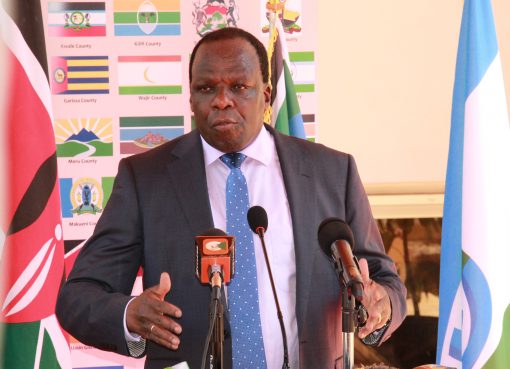At least 30 per cent of Kajiado County residents are illiterate.
According to the 2019 Kenya Population and Housing Census report, there are 111, 547 people who went to school but did not complete their studies while 182, 329 never stepped into a classroom to learn. This translates to 30 percent of the population in Kajiado being illiterate.
County Director of Adult Education Salome Terah attributed the high numbers of illiterate people in the County to the huge shortage of trained teachers as well as inadequate capacity of the officers mandated to ensure that the curricula is followed to the set standards.

Kajiado County Adult Education Director Salome Terah addressing adult education learners at Namanga, Kajiado County. Photo by KNA.
“We have limited capacity to reach to everybody, we only have 19 qualified teachers in the entire County that has five vast sub counties. The rest of the teachers are untrained volunteers. Lack of classrooms is also a big issue. At times we have to liaise with churches to allow us to use their facilities,” said Terah.
Furthermore, the County Director noted that the stipend given out to the untrained teachers is small, hence they are not very motivated.
“Among the 53 untrained volunteer teachers, there are many who are not wholly dedicated to teaching because of the paltry Sh2, 000 stipend that they are getting per month. They always get this money after 5 months, where they receive Sh10, 000 and this is not enough for their daily basic needs, thus they keep on quitting and leaving the learners on their own,” she added.
The Director also said cultural beliefs and practices like Female Genital Mutilation (FGM) and early marriages also contribute to the high levels of illiteracy among the pastoralist community and urged the residents to stop outdated cultural values and embrace change.

She said traditional beliefs mostly among men were also a hindrance to attainment of basic education as some men in the Maasai community view adult education programs as a preserve for women and idlers.
Most of them especially the elderly believe it is a taboo to sit in the same room or interact freely in public with women.
“There are some men who believe that they are not supposed to mix freely with women in public, thus cannot share a classroom or accept to be taught by women, sabotaging literacy efforts,” said Terah.
Other challenges adversely affecting the sector include lack of adequate personnel, poor infrastructure, insufficient funding, poor learning environments and lack of updated learning and teaching materials, she added.
She revealed that the Adult Education department was seeking to strengthen its partnership with the County government to ensure that literacy levels especially among the elderly is improved.
Kajiado County has 89 Adult Education Centres which include basic, non-formal, adult and continuing education and one multi-purpose training center.
By Rop Janet and Albert Lemomo




